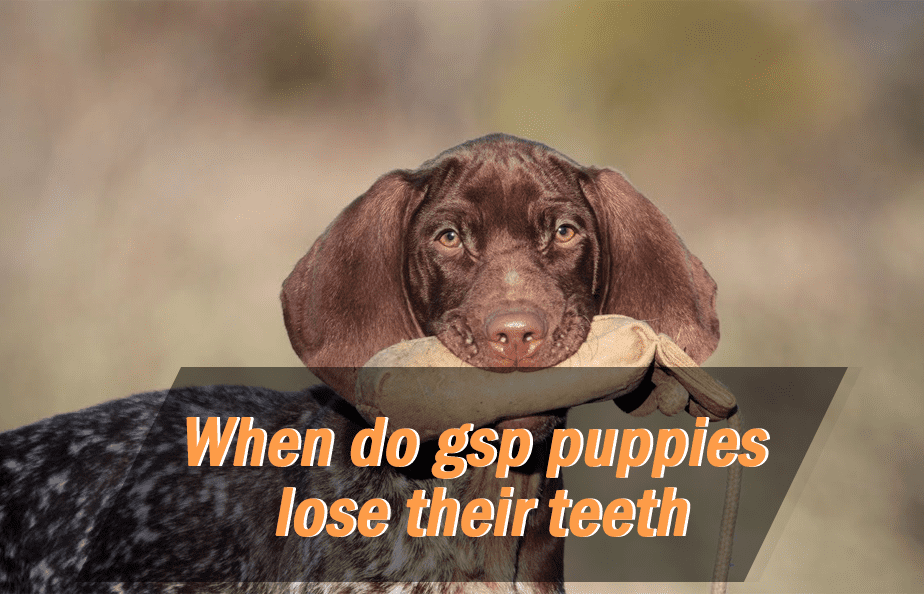If you’re a recent owner of a German shorthaired pointer puppy, you must be wondering when do GSP puppies lose their teeth? Like any other dog breed, GSP puppies lose their baby teeth, replaced by stronger adult teeth. This new set of teeth is super strong and helps them quickly bite, chew, and tear through their food.
In this article, we attempt to answer some of the common questions regarding GSP’s dental health:
- What is the teething timeline for GSP puppies?
- Can GSP puppies be trained in dental hygiene?
- When should my GSP lose their front teeth?
- Do GSP puppies ever calm down?
German shorthaired pointer puppies start to lose their baby teeth when they’re around 4 to 6 months old. These puppies are born without visible teeth, which only start growing after 3 weeks, and they end up with 42 adult teeth once the teething process is over.

What month do puppy teeth fall out?
Your GSP’s first set of sharp baby teeth will start falling out when they reach the age of 4-6 months old. While the timing for teeth growth and falling out is highly dependent on the breed of the dog, it is typical for most puppies to lose their teeth by a maximum of 7 to 8 months after the baby teeth grow out.
After this, their new adult teeth start growing, which amounts to 42 strong teeth to help them chew their food. When their teeth fall out, some puppies may experience a loss of appetite because of the gum pain and their frustration in curbing the pain.
What does the teething timeline of GSP puppies look like?
Depending on the dog’s breed and size, the teething process can vary, but here is a typical timeline was given by the AKC on how the teething process happens in puppies:
2 to 4 weeks:
The puppy will still be nursing, but the first set of sharp temporary teeth will start to grow at this stage. The puppy’s eyes also begin to open at this age.
5 to 6 weeks:
All the baby teeth have already grown, totaling about 28 baby teeth. The puppies can eat soft food at this stage since they have teeth to chew on them.
12 to 16 weeks:
First, it begins with the incisors and gradually loses their canine teeth and molar. This is the time when all their baby teeth start to fall out. During this stage, you need to give your puppies adequate care.
The best way to curb the property damage is to give them soft chew toys and treats to help in the teething process. You can start touching the puppy around the mouth and inside to get accustomed to teeth brushing. This period is the perfect time to train them on dental hygiene.
6 months and above:
All the puppy’s baby teeth would have fallen out at this stage, making room for the new adult teeth to come in. Typically, all adult dogs have 42 teeth by the end of the process. It’s quite a painful process, so you should pay close attention to the puppy and care for them by providing lots of soft treats and chew toys.
Some GSP puppies may also experience sore gums or bleeding gums, so the treats and toys will help soothe the pain away. You don’t have to worry about the puppies swallowing their baby teeth that fall out since they’re tiny and easily digestible.
How to train GSP puppies in dental hygiene?
Like other dog breeds, many GSPs also suffer from dental problems, so you need to take proper care of their dental hygiene from the puppy stage. It can be challenging to train an adult dog to enjoy teeth brushing, so it is recommended to teach them when they are still babies.
The best time, according to experts, is to start the act of touching their mouth and teeth when they begin to grow their adult teeth. This is a low-stress stage of their life, so they can get used to you touching their mouth without feeling threatened or scared.
Make sure that you use toothbrushes and toothpaste suitable for dogs since human products can be harmful to them. You can consult a vet to get an idea of what kind of toothpaste and brush to use for your GSP.
It is typical for most dogs to learn how to tolerate brushing if you teach them when they’re still young, and the process can be more tedious and lengthy when it comes to adult dogs. It is best not to force the brushing ritual on the puppy. Instead, start with baby steps, such as letting the puppy sniff the brush and lick the paste before entering the mouth.
When should my puppy lose their front teeth?
The incisors, the front teeth, are the first to fall out when the teething process starts in puppies. GSP puppies lose their front teeth within 2 to 4 months, and Puppies grow their permanent teeth as soon as they lose their baby teeth.
Gradually, they will start losing their canine teeth, the premolar and molars, until all their baby teeth have fallen out and are replaced with 42 strong adult teeth. As puppies, they only have approximately 28 baby teeth, but when their jaws start to grow, making more room for the extra teeth, they have 42 teeth.
Which puppy teeth fall out first?
The first puppy teeth to fall out are the front incisors. This happens with GSP puppies when they’re about 2 to 3 months old. The incisors fall out first, followed by the canine teeth and the molars, which happen only when they are at least 3 or 4 months old.
However, the exact age and time when your puppy will lose its teeth are determined by the breed and size of the dog. German shorthaired pointer’s adult teeth only start growing when they are about 6 months old when they start teething and chewing on things.
How to help GSP puppies during the teething process?
As with humans, the teething process can be very uncomfortable, frustrating, and painful. The best way to help during the teething process is to get them to chew toys and soft treats and use reinforcements for training.
When GSP puppies start losing their baby teeth, they start chewing on hard objects like bones, wood, furniture, or even your personal belongings, which gives them a lot of relief from the pain and soreness of the gums.
It can be an equally frustrating time for the owners since they are on a mission to destroy everything in view. Additionally, the puppies are hard to train at this stage, so they may not know how to obey commands, no matter how much you tell them not to.
Patience:
Although it’s a given, there’s nothing more virtuous than being patient with your GSP puppy during the teething process. Negative reinforcements are a better way to train your puppy not to chew on furniture than punishing them since they might not understand why they are getting punished. Instead, your dog may develop trust issues with you and punish them during their period.
You can choose to take the item away from the pup when you catch them chewing on it instead of punishing them when they’re chewing and condition the chewing with punishment. You can replace the item they are not supposed to chew with a soft chew toy or some teething products, which will help ease the pain they are experiencing without causing damage to your belongings.
Set up a “safe” space:
If your German Shorthaired Pointer is getting extremely hyperactive and chewing on everything in the house, you can create a safe space where there’s nothing to chew on or destroy for the pup.
This enclosed space can include a bed, food, water, and a few chew toys to help them ease the frustration. You also don’t have to keep an eye out for the dog if you have a space because you’re assured of the safety of your belongings.
Do GSP puppies ever calm down?
German Shorthaired Pointers are super excitable and full of energy. They love being active and tend to be restless, especially when they are still puppies. They typically calm down by reaching one or two years of age.
Because they have a lot of energy, you’ll often find them walking and roaming around the house without a moment’s rest. The best way to keep it under control is to take them out for walks. Regular exercise GPS puppies are hyperactive and love to play around regardless of their age.
One of the common reasons German Shorthaired Pointers tend to be hyperactive is that they are a breed developed for hunting. They are also extremely quick on their feet, serving the purpose of working as hunting companions.
In some cases, even adult GSPs tend to have a little bit of this puppy energy and are ever ready to play around. If you want to keep the unruliness under control, you need to put your GSP under proper training sessions and find a good energy outlet that you and your GSP enjoy together.
Conclusion:
During the teething stage, GSP puppies are at their most hyper, so they can prove to be challenging to control. The only way to get them under control is to find an energy outlet such as exercise and going for walks.
However, you shouldn’t’ over-exercise your GSP puppies because their bones and joints are still fragile at this point, and over-exertion can lead to permanent damage. Talk to a vet to know just how far you can take your puppies for walks and what are the best exercises for the breed.

